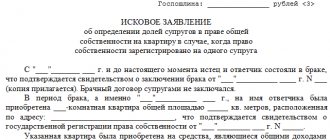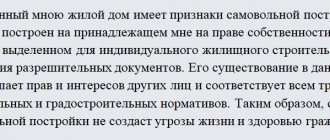In order to be able to fully dispose of the acquired real estate, it is necessary to re-register ownership. This is a short procedure, but it requires a number of steps and consideration of certain points.
It is important to understand how the transfer of ownership of real estate is carried out and how much this procedure costs. To do this, it is useful to know the provisions of the current legislation governing this area.
How to reduce personal income tax when selling real estate?
Based on paragraph 5 of paragraph 1 of Article 208 of the Tax Code of the Russian Federation and paragraph 1 of Article 224 of the Tax Code of the Russian Federation, an individual who sold an apartment, house, land plot or shares in the specified real estate is obliged to pay 13% of the income received to the budget. However, there are benefits that will reduce tax amounts. Thus, when selling real estate that has been owned by an individual taxpayer for more than three years, there is no need to pay tax at all (clause 17.1 of Article 217 of the Tax Code of the Russian Federation), just as there is no need to fill out the corresponding tax return (clause 4 of Article 229 of the Tax Code of the Russian Federation). However, in this case, it is important to correctly determine the period of ownership of the property. As a general rule, it is determined based on the date of registration of ownership of property or a share in it (clause 1 of Article 131 of the Civil Code of the Russian Federation, clause 2 of Article 223 of the Civil Code of the Russian Federation), indicated in the certificate of state registration. For a land plot, the period of its ownership by an individual is determined from the moment of registration of the right to a new plot obtained as a result of dividing the original one (Letter of the Ministry of Finance of Russia dated December 17, 2013 N 03-04-07/55742). If the property being sold was received by inheritance, then in order to determine the period of ownership, it should be remembered that the right of ownership arises from the date of death of the previous owner or from the moment of registration of rights to the property, if the right of ownership to the common property arose after the death of the spouse/shareholder. For real estate acquired with the participation of the taxpayer in a housing construction cooperative, the period of ownership is calculated from the moment of payment of the share contribution in full or the date of transfer of the real estate under the acceptance certificate, if this occurred later than the full payment of the cost of the real estate.
Article 223. The moment of emergence of the ownership right of the acquirer under the contract
Ruling of the Supreme Court of the Russian Federation dated March 15, 2019 N 308-ES19-1246 in case N A63-6298/2016 Resolving the dispute, the district court, guided by the provisions of Articles 223, 301, 302 of the Civil Code of the Russian Federation, taking into account that the real estate was not alienated by Sasina G.A., and by another person in a gratuitous transaction, on the basis of a forged document, without the will of the legal owner, the presence of the will of Sasina G.A. the alienation of the disputed objects has not been confirmed, came to the conclusion that the disputed property can be claimed from a bona fide purchaser.
Ruling of the Supreme Court of the Russian Federation dated 04/08/2019 N 304-ES17-3813(3) in case N A03-18961/2015
In canceling the judicial act adopted in the case, the district court, guided by the provisions of Articles 8.1, 218, 219, 223, 551, 1152 of the Civil Code of the Russian Federation, the explanations given in paragraph 6 of the Resolution of the Constitutional Court of the Russian Federation dated May 26, 2011 N 10-P, and also in paragraph two of paragraph 3 of the resolution of the Plenum of the Supreme Court of the Russian Federation dated June 23, 2015 N “On the application by courts of certain provisions of Section I of Part One of the Civil Code of the Russian Federation”, considered erroneous the conclusions given therein that the completion of the procedure for the sale of the debtor’s property and his exemption from further fulfillment of obligations to creditors does not affect the rights and legitimate interests of M.V. Ilyina, who acquired encumbered property at an auction and does not have an objective opportunity to register her right in relation to the said property due to its continued presence in the bankruptcy estate of the debtor.
Determination of the Constitutional Court of the Russian Federation dated March 26, 2019 N 762-O-R
1. The Constitutional Court of the Russian Federation, by Decision No. 2554-O dated November 23, 2021, refused to accept for consideration the complaint of citizen S.G. Gorchakov for violation of his constitutional rights by paragraph 2 of Article 8.1, paragraph 1 of Article 131 and paragraph 2 of Article 223 of the Civil Code of the Russian Federation, since it did not meet the requirements of the Federal Constitutional Law “On the Constitutional Court of the Russian Federation”, according to which the complaint to the Constitutional Court of the Russian Federation is considered acceptable.
Determination of the Judicial Collegium for Civil Cases of the Supreme Court of the Russian Federation dated July 30, 2019 N 4-КГ19-28
The grounds and procedure for acquiring rights to individual objects from among the property of common use are determined by land and civil legislation. Taking into account that most of the relevant objects belong to immovable things, the rights to them in accordance with paragraph 2 of Art. 8.1, Art. 219, paragraph 2 of Art. 223 and paragraph 1 of Art. 234 of the Civil Code of the Russian Federation, paragraph 2 of Art. 4 of the Federal Law “On State Registration of Rights to Real Estate and Transactions with It” are subject to state registration and arise from the moment of such registration. By virtue of the above provisions, state registration of rights to objects of infrastructure serving individual residential buildings (engineering networks and systems, transformer substations, heating points, collective parking lots, garages, children's and sports grounds, roads, etc.) completes the legal structure entailing the emergence of rights to the property.
Ruling of the Supreme Court of the Russian Federation dated October 11, 2019 N 308-ES19-17024 in case N A32-50795/2017
Resolving the dispute, the appellate court, with which the district court agreed, was guided by articles 218, 223, 224, 284, 301, 305, 329, 359 of the Civil Code of the Russian Federation, the explanations contained in paragraphs 32, 36 of the resolution of the Plenum of the Supreme Court of the Russian Federation and Plenum of the Supreme Arbitration Court of the Russian Federation dated April 29, 2010 N /22 “On some issues arising in judicial practice when resolving disputes related to the protection of property rights and other property rights”, establishing that the controversial medical equipment that was the subject of the supply agreement dated June 23 .2016, not paid in full, the company (supplier) is the legal owner of the property, and therefore the company, as the non-owning owner, could not transfer the disputed property to the institution, and the latter could not have the right of operational management of the requested equipment derivative method (paragraph 1 of paragraph 2 of Article 218, paragraph 1 of Article 224 of the Civil Code of the Russian Federation).
Ruling of the Supreme Court of the Russian Federation dated October 21, 2019 N 310-ES19-17938 in case N A83-10660/2017
Similar norms are contained in Articles 131, 223 and the Civil Code of the Russian Federation, according to which rights to property subject to state registration arise, change and terminate from the moment the corresponding entry is made in the state register, unless otherwise provided by law. In accordance with paragraph 1 of the Resolution of the State Council of the Republic of Crimea “On issues of managing the property of the Republic of Crimea” dated 04/30/2014 N 2085-6/14 for the period of integration of the Republic of Crimea into the Russian Federation and until the delimitation of property between the Russian Federation, the Republic of Crimea and municipal property , but no later than 01/01/2015, all state property (state of Ukraine) and ownerless property located on the territory of the Republic of Crimea are accounted for as property of the Republic of Crimea.
Ruling of the Supreme Court of the Russian Federation dated November 11, 2019 N 304-ES19-19978 in case N A75-18740/2018
In resolving the dispute, the courts were guided by Articles , 218, 223, 329, 334, 334.1, 335, 348, 350.1, 454, 491, 807, 810 of the Civil Code of the Russian Federation and, having examined and assessed the evidence presented in the case materials according to the rules of Article 71 of the Arbitration Code procedural code of the Russian Federation, including the terms of interest-free loan, pledge and supply agreements, were based on the absence of grounds for refusing a claim aimed at protecting the rights of a bona fide pledgee who had no reason, acting reasonably and exercising the required diligence, to doubt that the borrower (third party) paid the supplier (defendant) for the equipment, is its owner and can pledge it to fulfill the obligation to repay the loan.
Ruling of the Supreme Court of the Russian Federation dated November 18, 2019 N 302-ES19-21182 in case N A33-12613/2018
The courts of the first and appellate instances, having examined and assessed, according to the rules of Article 71 of the Arbitration Procedure Code of the Russian Federation, the evidence presented in the case materials, guided by Articles 209, 218, 223, 429, 454 of the Civil Code of the Russian Federation, the explanations given in paragraphs 36, 59, 61 of the resolution of the Plenum of the Supreme The Court of the Russian Federation and the Plenum of the Supreme Arbitration Court of the Russian Federation dated April 29, 2010 N /22 “On some issues arising in judicial practice when considering disputes related to the protection of property rights and other property rights”, establishing that several agreements were concluded in relation to the disputed property purchase and sale agreements, came to the conclusion that there were grounds for recognizing the entrepreneur’s ownership of the property specified in the claim.
Ruling of the Supreme Court of the Russian Federation dated December 4, 2019 N 309-ES19-22854 in case N A60-72059/2017
The appellate court, having assessed and examined the content of the application submitted by the Company to review the judicial act based on newly discovered circumstances and the documents attached to the application, guided by Articles 270, 272, 311 of the Arbitration Procedure Code of the Russian Federation, Articles 8.1, 131, 218, 223 of the Civil Code of the Russian Federation, clarifications, given in the resolution of the Plenum of the Supreme Arbitration Court of the Russian Federation dated June 30, 2011 N “On the application of the provisions of the Arbitration Procedural Code of the Russian Federation when reviewing judicial acts based on new or newly discovered circumstances”, in paragraph 52 of the resolution of the Plenum of the Supreme Court of the Russian Federation and the Plenum of the Supreme Arbitration Court of the Russian Federation Federation dated 04/29/2010 N /22 “On some issues arising in judicial practice when considering disputes related to the protection of property rights and other real rights”, taking into account the circumstances established by the arbitration court when considering case N A60-48288/2015, came to the conclusion that the court of first instance incorrectly applied the rules of procedural law, canceled the ruling dated 03/07/2019 and sent the issue of reviewing the judicial act based on newly discovered circumstances for a new consideration to the court of first instance.
Determination of the Judicial Collegium for Civil Cases of the Supreme Court of the Russian Federation dated November 26, 2019 N 5-КГ19-191, 2-3335/2018
In accordance with Article 223 of the Civil Code of the Russian Federation, the ownership right of the acquirer of a thing under a contract arises from the moment of its transfer, unless otherwise provided by law or contract (clause 1). In cases where the alienation of property is subject to state registration, the acquirer's ownership rights arise from the moment of such registration, unless otherwise provided by law (clause 2).
Ruling of the Supreme Court of the Russian Federation dated December 17, 2019 N 305-ES19-24046 in case N A40-249745/2018
When resolving the dispute, the courts were guided by articles 223, 307, 309, 310, 393, 801, 803, 805 of the Civil Code of the Russian Federation, paragraph 1 of article 7 of the Federal Law of June 30, 2003 N 87-FZ “On transport and forwarding activities”, article 17 of the Convention on the Contract for the International Carriage of Goods of May 19, 1956, and, having examined and assessed in the manner prescribed by Article 71 of the Arbitration Procedural Code of the Russian Federation, the evidence presented by the parties, came to the conclusion that damage to the cargo occurred due to circumstances that the defendant, who demonstrated the degree of care and prudence that was required of him in order to properly fulfill his obligations could not be prevented.
Features for the seller
It is important for the seller to relieve himself of the obligation to preserve the item when it is transferred not to the buyer personally, but to a third party: the carrier, the delivery service, since he does not control the transportation process and does not carry it out personally. In contracts, the right to transfer ownership of goods upon import is determined upon delivery to the first carrier; the carrier is responsible to the buyer for the safety of the item.
For long-term deliveries, we recommend agreeing with your counterparties on terms that are convenient for both parties to the legal relationship. The party preparing the draft agreement is not recommended to include provisions that are obviously unacceptable to the counterparty.
Registration procedure and rules
Registration of the transfer of rights to real estate is carried out in accordance with the procedure specified by law. If it is violated, difficulties may arise. Therefore, it is important for citizens to know the algorithm of actions and a number of rules for the successful re-registration of ownership rights to an object.
First you need to prepare a package of documents. It should include the following documents:
- passport;
- title document for the apartment (extract from the Unified State Register of Real Estate);
- document providing the basis for the transfer of ownership (purchase and sale agreement, act of acceptance and transfer of real estate, court decision, etc.);
- technical plan of the facility.
You need to fill out an application. It is drawn up on a standard form, which can be obtained from the registration office. It is recommended to write such a document at an appointment with a specialist.
In this case, if any questions arise, you can immediately consult. A government agency employee will tell you how to fill out the application correctly and quickly. Registration is carried out directly at Rosreestr.
But citizens can also contact the Multifunctional Center. This institution is considered an intermediary. Provides a range of municipal and government services, including re-registration of rights. The MFC operates in single window mode. Citizens are accepted with coupons and by appointment.
This eliminates the occurrence of long queues. It takes no more than a quarter of an hour to submit documents. Having decided on a government agency, you should come to an appointment with a specialist with a package of documents.
An employee of the organization will issue a receipt for payment of the state fee. Transferring money can be done through a terminal or at a bank cash desk. It is important to keep the receipt.
It will need to be provided to a specialist from Rosreestr or the MFC (depending on where the citizen applied) as confirmation of payment for the provision of public services. An employee of the organization will issue a receipt for documents acceptance. When re-registration is completed, the applicant will be notified by telephone. To confirm the transfer of ownership rights, an extract from the Unified State Register will be issued.






